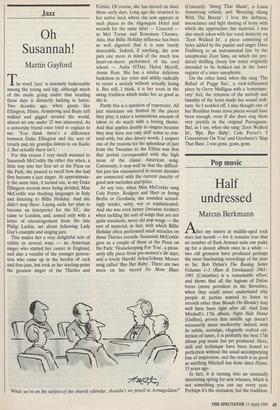Jazz
Oh Susannah!
Martin Gayford
The word 'jazz' is intensely fashionable among the young and hip, although much of the music going under that heading these days is distinctly lacking in lustre. Two decades ago, when giants like Ellington, Hines, Armstrong and Basie still walked and gigged around the world, almost no one under 25 was interested. As a university friend once tried to explain to me: 'You think there's a difference between Duke Ellington and the sort of treacly pap my grandpa listens to on Radio 2. But actually there isn't.'
For this reason I very much warmed to Susannah McCorkle the other day when, a little way into her first set at the Pizza on the Park, she paused to recall how she had first become a jazz singer. At approximate- ly the same time, it turned out, as my Duke Ellington records were being derided, Miss McCorkle was studying languages in Italy and listening to Billie Holiday. And she didn't stop there. Laying aside her plan to become an interpreter for the EC, she came to London, and, armed only with a letter of encouragement from the late Philip Larkin, set about following Lady Day's example and singing jazz.
This makes her a very delightful sort of oddity in several ways — an American singer who started her career in England; and also a vocalist of the younger genera- tion who came up in the heyday of rock and free-jazz, but took as her starting-point the greatest singer of the Thirties and Forties. Of course, she has moved on since those early days. Long ago she returned to her native land, where she now appears in such places as the Algonquin Hotel and records for the same label — Concord as Mel Torme and Rosemary Clooney. Also, that Billie Holiday influence has been so well digested that it is now barely detectable. Indeed, if anything, she now puts one more in mind of the much less heart-on-sleeve performers of the cool school — Anita O'Day, Helen Merrill, Annie Ross. She has a similar delicious huskiness in her voice and ability radically to recast a melody without actually losing it. But still, I think, it is her roots in the swing tradition which make her as good as she is.
Partly this is a question of repertoire. All jazz musicians are limited by the pieces they play; it takes a tremendous amount of talent to do much with a boring theme. And that applies doubly to singers because they may have not only duff notes to con- tend with, but also dreary words. I suspect one of the reasons for the splendour of jazz from the Twenties to the Fifties was that that period corresponded with the high noon of the classic American song. Conversely, it may well be that the difficul- ties jazz has encountered in recent decades are connected with the current paucity of good new melodies and lyrics.
At any rate, when Miss McCorkle sang Cole Porter, Rodgers and Hart or Irving Berlin or Gershwin, she sounded accord- ingly tender, witty, wry or sophisticated. And she was even better (because fresher) when tackling the sort of songs that are not quite standards, more old pop songs — the sort of material, in fact, with which Billie Holiday often performed small miracles on those Thirties records. Susannah McCorkle gave us a couple of these at the Pizza on the Park: 'Housekeeping For You', a pleas- antly silly piece from pre-women's lib days, and a lovely Harold Arlen/Johnny Mercer song called 'Bye Bye Baby'. There are two more on her record No More Blues 'While we're on the subject of the church calendar, shouldn't we pencil in Armageddon?' (Concord): `Swing That Music', a Louis Armstrong vehicle, and 'Breezing Along With The Breeze'. I love the deftness, insouciance and light dusting of irony with which she approaches this material. I was also much taken with her vocal dexterity on `Zoot Walked In', a piece consisting of lyrics added by the pianist and singer Dave Frishberg to an instrumental line by the saxophonist Zoot Sims, on which she pro- duced thrilling chesty low notes originally intended to be hohked out in the lower register of a tenor saxophone.
On the other hand, when she sang 'The Ballad of Peggy Sue', a rock-influenced piece by Gerry Mulligan with a 'contempo- rary' feel, the triteness of the melody and banality of the lyrics made her sound ordi- nary. So I nodded off. I also thought one of her Brazilian bossa nova pieces would have been enough, even if she does sing them very prettily in the original Portuguese. But, as I say, when she sang `Zoot Walked In', 'Bye, Bye Baby', Cole Porter's 'I Concentrate On You' and Gershwin's 'Slap That Bass', I was gone, gone, gone.


























































 Previous page
Previous page